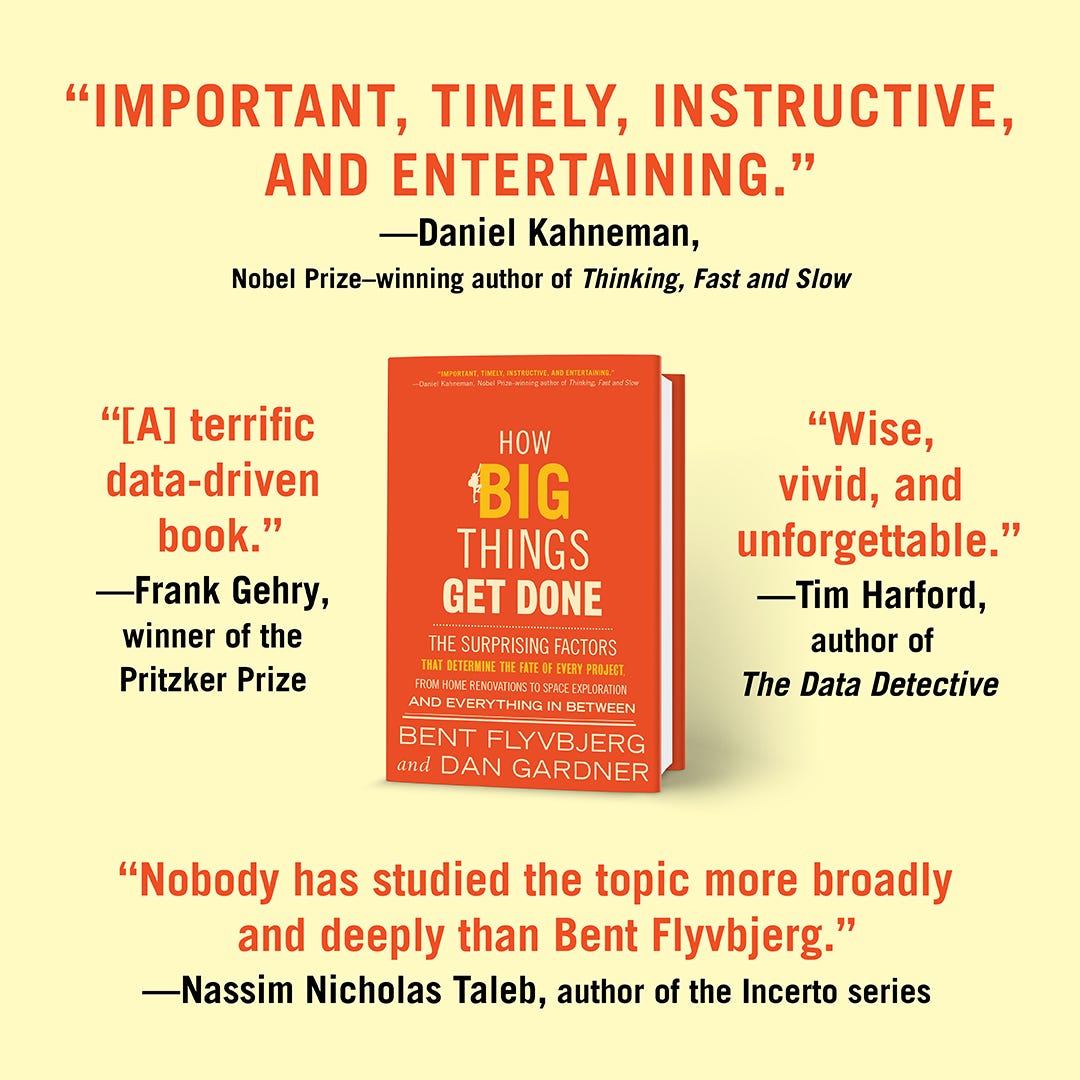A Few Notes About Various Matters
Including thoughts on the glorious technologies delivering said notes
With apologies to those who prefer long disquisitions about obscure subjects — like how Warren Harding saved the world from Hitler and the continuing tragedy that is the assassination of James Garfield — this post consists of a few short comments on a variety of items.
Some of it may even be relevant. I beg your forgiveness.
A word about Jonathan Haidt.
I’ve been a fan of the social psychologist Jonathan Haidt for as long as I’ve been studying psychology. (If you’ve ever seen one of my talks, I likely mentioned “the elephant and the rider,” an evocative metaphor for “System One and System Two” — the forgettable labels in the two-system decision-making model made famous by Daniel Kahneman in Thinking Fast and Slow. The “elephant and rider” metaphor is Haidt’s.)
If you follow Haidt’s work, you know that in recent years he has been a leading figure in important debates, including the effects of social media, growing unwillingness to be exposed to (or even permit) the public expression of contrary views, and polarization/Balkanization. I remain agnostic about many of Haidt’s views, if only because I try not to draw conclusions about matters I don’t have time to really study and think about. But there’s no question Haidt’s work is serious, substantive, and challenging. And urgent.
It’s also now on Substack.
This introductory post is classic Haidt. Clear, engaging, and thoughtful. Self-aware. Generous and humane. And directly relevant to some of the pressing issues of our time.
What I’m saying is: Stop wasting time reading me and subscribe to Jonathan Haidt.
Books I haven’t read but want to.
My work requires me to read a lot of books. I would never complain about that. I love my work and I love the books I have to read for it. I’m a lucky guy.
But that makes it difficult for me to read books that look fascinating but have little or no connection with my work. I still buy them, naturally. Publishers and writers deserve our support, say I. But an unfortunate number tend to collect on my nightstand, where they whisper, “you’re lazy” as I try to fall asleep.
To ease my guilt, I thought I’d start occasionally plugging books I own and want to read but have not, books I don’t own but I’m tempted to buy, and forthcoming releases that look intriguing.
First up: The Contagion of Liberty, Andrew M. Wehrman.
During the worst of Covid, I came across the Twitter account of Andrew Wehrman, a professor of history at Central Michigan University. It was a time when many voices were loudly insisting that vaccines and restrictions on liberty were un-American, and Wehrman did something elegantly revealing: He tweeted news stories from disease outbreaks in history during which good, honest, red-blooded Americans enthusiastically supported … vaccines and restrictions on liberty. Many of these responses far surpassed anything we saw during the worst of Covid. Picture doctors going door to door accompanied by policemen, offering vaccination to those who wanted it and sticking needles in the arms of those who didn’t. Whatever you think of restrictions on liberty in the face of outbreaks, they are as American as George Washington.
And it is to Washington himself that Wehrman turns in The Contagion of Liberty. From the dust jacket:
The Revolutionary War broke out during a smallpox epidemic, and in response, General George Washington ordered the inoculation of the Continental Army. But Washington did not have to convince fearful colonists to protect themselves against smallpox―they were the ones demanding it. In The Contagion of Liberty, Andrew M. Wehrman describes a revolution within a revolution, where the violent insistence for freedom from disease ultimately helped American colonists achieve independence from Great Britain.
Next up is Rule Nostalgia by Hannah Rose Woods.
Starting in the present and working backwards, Woods chronicles Britons pining for the good old days. Decade after decade. For centuries.
There’s no North American release scheduled, as far as I can make out, but this looks so interesting I may have to have a copy shipped across the vast Atlantic.
And finally, Colonialism: A Moral Reckoning by Nigel Biggar.
If you know my writing, you know I love to rail against simplistic and/or poorly informed moral judgments of complex historical realities. (A good rule of thumb for both life and history: It’s more complicated than you think.) And few historical realities are as complex as that of the British Empire — the umbrella term we use to sum up four centuries of history involving hundreds of millions of people on every inhabited continent in the world.
Biggar is an Oxford theologian and ethicist who argues that the newly fashionable depiction of the British Empire as unrelievedly evil from beginning to end is ahistorical nonsense. The record is much more mixed, he argues. When Brits read their history, they have good reason to feel both shame and pride.
That doesn’t sound terribly controversial to me — I’m using British understatement there — but Biggar’s work has, apparently, been enormously controversial. So controversial that his initial publisher, after expressing great enthusiasm for the book, dropped it when political winds became chillier in 2020.
I should say I don’t follow British debates closely and don’t know much about this particular controversy beyond these broad outlines. If British readers would like to chime in, please do. But as someone fascinated by how history is seen and used in the present, I look forward to digging into this when time permits some day.
And speaking of books, have I told you about my forthcoming book? I have? Well, as Oscar Wilde did not say, repetition is the sole of wit.
As you may know, I co-wrote a forthcoming book with Professor Bent Flyvbjerg of Oxford University.
How Big Things Get Done will be released in the United States and Canada next Tuesday, and in the United Kingdom and the rest of the English-speaking world the week after.
What’s that, you ask?
“How can I immediately order my copy of the book that legendary psychologist Daniel Kahneman called ‘important, timely, instructive, and entertaining’ and ensure the earliest possible delivery?”
What an excellent question. Happily, my publisher has created this website where you and your credit card will find the answer.
A note for those who would like a defaced copy.
I don’t get the allure of a book signed by the author.
It strikes me as vandalism. When I come across an author’s signature, I demand my money back. (Unless the author is dead. For some reason, that changes how I feel. The deader the better. An old book written by an author utterly forgotten today and dead for a half century or more gives me goosebumps. It may be subconscious recognition of my fate.)
But many people don’t feel the way I do. So I promised I would sign and send a couple of copies of the new book to the wonderful people who, for reasons I cannot grasp, have taken out paid subscriptions to this newsletter even though the minimum rate (set by Substack) is much too high and I make practically all my posts free to everyone anyway. I also said I’d do the same for one person randomly selected from those who made the baffling decision to upgrade from a free to a paid subscription.
The numbers of people in both categories are now puzzlingly high.
You are giving me money for something I give away for free. A lot of you even wrote to tell me you very much want a copy of a book you could buy for a lot less than the cost of your subscription provided I scribble some graffiti in it.
Homo economicus is a fraud.
Still, this is what the people want. And I am — like Bane and Trump — for the people.
So I’ve decided to add several more books to this strangely enticing offer. If you want a chance of winning a copy of a book you could order right now at less cost, and you want me to deface it with some inane comment like “happy reading, Bob!” then please upgrade to a paid subscription. I’ll pick “winners” in a week.
And a sincere thank you to all my paid subscribers. I may not understand why you offer it, but I do appreciate your support.
A word about Frank Gehry.
A man with a major role in How Big Things Get Done is the world’s most renowned living architect, Frank Gehry.
In the latest edition of the Harvard Business Review, Bent and I published a look at Frank Gehry and his planning and delivery of big projects. People seldom think of Gehry this way. They see him as a Jackson-Pollock-like artist, the sort of mad dreamer who lives by impulse and doesn’t give a damn about petty concerns like schedules and other people’s money.
That view was summed up in an episode of The Simpsons. Gehry lent his voice to the episode but later regretted having done so because it seemed to confirm glib popular assumptions about how he works.
In fact, Gehry cares very much about practical matters like how long it takes to build something and how much it costs. And his record is exemplary: He is commonly on budget and on time. If Gehry designed and delivered standard, cookie-cutter buildings, that would be impressive. But as someone who routinely insists on building things that have never been built before, his record is downright miraculous.
For those of you who don’t subscribe to HBR, you can now read the full essay here.
Score another one for Kevin Kelly.
Many years ago, Kevin Kelly, the founding editor of Wired, challenged himself and his readers to find technologies that were not merely antiquated and rarely used. They were extinct. Gone like the dodo. Not used by anyone. Anywhere.
I met Kelly once, I think a little more more than a decade ago, and he shared with me several fabulous stories about what happened next.
They couldn’t find a truly extinct technology. Not one.
No matter how old the technology. No matter how long ago the technology had been superseded. Someone, somewhere, was still using it.
Kelly concluded that no technology ever truly vanishes from the face of the Earth. I instinctively rebel against such sweeping claims but, so far as I know, it has held up.
I thought of Kelly’s rule while reading Smithsonian Magazine recently.
No technology should be deader than Morse code. Samuel Morse invented it as a way to turn electrical impulses surging through wires into meaningful communication. The telegraph and Morse code transformed the world.
When Guglielmo Marconi introduced the “wireless telegraph” — which a later generation would call “radio” — Morse code was again essential. Marconi’s transmitter could only generate pulses of radio waves so it was incapable of carrying the human voice, much less music or other sounds. But by varying the pulses — long for a dash, short for a dot — and using Morse code, radio could communicate.
Morse code ruled the modern world. For a while.
The rise of the continuous-wave radio transmitter allowed people to communicate via radio waves simply by speaking. That was the real invention of modern radio. Morse code continued to dominate Maritime communications and it was essential in military operations, but the dots and dashes were on the wall. Morse code began its long, slow slide into obscurity. The last commercial Morse code transmission in the United States was made in 1999.
But Morse code isn’t extinct. As the Smithsonian reported, its use in the United States has even seen some modest growth recently.
I’ll apply Kevin Kelly’s rule and make a bold prediction: A century from now, cultural memory of Morse code may be all but extinguished, and Morse code will be as far removed from modern communications as beacon fires. But some people, some where, will still be using it.
If I’m wrong, feel free to let me know in 100 years.
Behold, the glory of the mundane.
The new HBO series The Last of Us is grim viewing. But one scene in the most recent episode made me want to stand up and cheer.
As Joel and Ellie are crossing the shattered hellscape that is America after a fungal pandemic collapses civilization, they see the smashed, charred ruins of a jumbo jet sprawled across a barren hill.
Ellie is too young to know life before the collapse. She looks at the plane in awe. “Did you ever fly in one?” she asks Joel.
Joel grumbles that it wasn’t so great. Planes were crowded. You got stuck in the middle seat. The food was bad.
Ellie looks at him with disgust. She says something like, “you got to fly! IN THE AIR!”
Ellie is right.
As human as it is to become inured to that which we routinely encounter — even wonders and horrors — we should never forget that every day we use technology Zeus would envy.
Take a look at the following map.
It’s from a new Substack feature for authors. It shows the country of origin of the subscribers to this newsletter.
I write in English so my readers skew toward the Anglosphere. I’m also Canadian, and a long-time journalist in this country, so Canada is disproportionately represented. No surprises there.
But look at the big picture.
There are readers of this humble newsletter in 101 countries.
There are readers in 49 of the 50 US states. (I don’t know what I did to offend South Dakota.)
There are 142 readers in India, 30 in Brazil, 15 in Nigeria, 4 in Taiwan.
There are two readers in Zambia. I love that. Shout out to Zambia!
Now picture this:
I’m sitting at the desk in a room of my house. My house is in Ottawa.
There is four feet of snow outside my window. A big grey squirrel is hanging off a bird feeder.
I’m pecking away at my keyboard. I will finish soon.
When I do, I will slide a plastic device a few inches across the surface of my desk and twitch my right index finger.
In an instant, everything I have written here will be delivered to specified individuals living in 101 countries around the world.
Someone in Saskatoon will read it.
And someone in Washington DC.
Rio de Janeiro. Taipei.
Mumbai and Moscow.
London and Lagos.
And most importantly, someone in Lusaka will read it. I love my Zambian readers.
This chain of events would have been literally inconceivable to my grandparents. It was science fiction when I was growing up. It was a cool story told by futurists when I was a young man.
Today, I routinely communicate this way. Billions do.
When people first encountered the telegraph, they thought it was astonishing. The telephone was wondrous. Radio was glorious. Television was magnificent.
They were right.
Time passed. People were inured and these technologies became background noise in modern life. But the changing of our perceptions didn’t change the technologies. They remain wonders — whether we are aware of their wondrousness or not.
So what about this newer technology you are using right now?
Email is understandably a synonym for drudgery. Too much of the Internet is given over to our worst impulses. As Jonathan Haidt is showing, there are serious concerns about the effects of social media.
And yet.
This technology? It is magic.
How lucky we are to be right here, right now.









The end of your missive reminded me of something I learned a while ago: ‘If it was invented before you were born it’s a tool, if it was invented after, it’s technology.’ I think of that all the time as I watch my students with their phones (all of whom are now essentially born after the introduction of the iPhone), while I still struggle in some aspects with it. I’m also reminded that at one time a pencil was considered new fangled technology and the slate was the standard classroom tool. From someplace southeast of Edmonton, where I’ve enjoyed reading your writing for decades. Cheers.
Hey Dan,
This is a great miscellania that gripped me on several fronts. As a young naval officer Morse Code was one of our basic courses, and it remains essential for communicating by Aldis Lamp (flashing light) for visual comms in radio silence -- I don’t see it going the way of the Dodo bird for that alone. And I rationalized raising our now-30-something daughters on The Simpsons by turning each episode into a “teaching moment” on the cultural references -- they mostly would roll their eyes but it seems to have worked out..... Indeed one of them now lives in England and is setting to write her citizenship test, so I’ve sent the email version of this post to her to consider whether “Rule Nostalgia” might be useful (with a warning “more likely not” -- they have a set version to learn in the approved book).
Anyways, to end, sign me up as interested in one of your freebies -- I’ve loved reading you since your Ottawa Citizen days in the ‘90s, in the meanwhile made a bit of a living as a past-present-futurist myself, and I’ve reached that happy stage in life where I can give something back by paying to keep a stock of fine writing. If I’m one of the annointed ones, an autograph please (it’s also the way I am) but no need for any other cutesy words.
I’ll stay subscribed in any event. ;-))